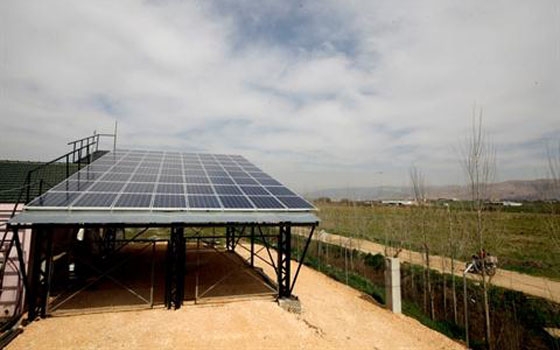In Lebanon’s fertile Bekaa Valley, a hobby farmer is sowing the seeds of solar energy, an idea that might help an area starved of affordable electricity.
“It’s important to reduce the cost,” says Fadi Jamaleddine, a Beirut-based corporate lawyer. He currently spends around $200,000 annually on the upkeep and maintenance of his weekend farm, nearly a quarter of which goes toward electricity expenses.
“I don’t want to be an angel and say I’m doing it because of global warming. This is my hobby. If it’s self-sustaining, I could make money and that’s great.”
What had started as a cost-saving measure for the weekend farmer soon turned into a mission to bring the area’s access to power in line with the 21st century through a grid-sharing scheme for himself, his new neighbors and fellow farmers. Unlike in Europe, it is not possible for Jamaleddine to sell his excess electricity in Lebanon.
The farm is a modern anomaly in the sparsely populated and pristine area, surrounded by green plains and snowcapped mountains near the village of Mansoura. Newly paved roads leading to the farm were just gravel before Jamaleddine purchased the property in 2008.
At the main entrance, a shiny flat square of 64 solar panels measuring 1.5 square meters soaks up the mid-day sun. On the Damascus highway that connects the farm to both the Lebanese and Syrian capitals, solar panels on top of the streetlight posts are a sign that Lebanon might be on the way to embracing alternative energy.
“This is a first for solar-powered irrigation on this scale in the area,” says Patrick Ardahalian, founder of Eco Friendly, an environmental consultancy that installs alternative energy systems for clients across Lebanon.
His latest big client was another hobby farmer from Western Bekaa with a vast plot of land that needs a constant supply of water to sustain a variety of plants and livestock.
“He’s leading by example,” Ardahalian said.
Jamaleddine came across the idea while researching alternative energy possibilities for his 120,000 square-meter organic farm, home to animals like goats, sheep and fowl, as well as tomato and grape vines, and apple and berry orchards, all of which require a constant water supply.
He discovered that by switching his irrigation system – which consumes the bulk of his electricity and costs nearly $4,000 per month – to solar power, he could make his farm self-sustaining and even profitable. In addition, he found he could share any excess power generated from the solar panels with his neighbors, who have long had to contend with frequent power outages and high generator costs.
Power cuts, although a daily occurrence in Lebanon, are particularly severe in the rural region of the Bekaa Valley, where it’s not uncommon for residents to have just six hours of electricity provided by the state-run Electricite du Liban, forcing them to rely on expensive and polluting generators.
In addition, the current in the Bekaa Valley is usually 120 volts, far below the 220 volts needed for daily appliances such as refrigerators.
Indeed, while the potential for alternative energy in Lebanon remains largely untapped, demand for power is growing. Ever since the Civil War ended in 1990, the country has faced daily power outages that have gotten worse with time as supply has fallen far behind what is required by the population.
Nationwide demand for electricity currently exceeds 2,400 megawatts a day, while production struggles at less than 1,500 MW. Power cuts have also worsened in recent years, as long overdue maintenance takes its toll on electricity supply.
The deteriorating situation has prompted large-scale protests throughout the country, particularly in rural areas where power cuts are most severe.
Although Lebanon’s severe power shortage should make it an ideal candidate for alternative energy, many residents and business owners find the startup cost prohibitive.
Jamaleddine’s solar panel installation cost approximately $76,000 and was imported from Germany, the world’s second largest producer of solar energy after China.
In fact, since he began researching alternative energy systems for his farm last year, the price of the panels had dropped by 25 percent, a result of the increased production of the technology.
Even though he had the cash to pay the amount up front, he decided to apply to Fransabank for a 0 percent interest “green loan” with the aim of showing others that they could do the same. The program was initiated by Lebanon’s Central Bank two years ago in order to encourage similar environmentally friendly projects in Lebanon.
While incentives for green business in Lebanon appear to be growing, many people, including local generator distributors – whose product compensates for the daily power outages – remain skeptical.
In addition to the high up-front costs, some wonder about the long-term sustainability of such projects. Right now, Jamaleddine has his eyes on his newly installed panels, eager and curious to see if they will live up to their promise.
“Many people are skeptical of alternative energy,” says Ardahalian. “They think it’s a gimmick, that you can’t get electricity for free. That’s why it’s important this system succeeds.”
The Daily Star
10 March

























































